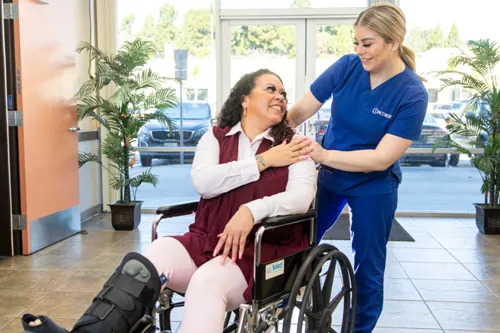
A common query among prospective nurses is the difference between the licensed practical nurse vs. registered nurse roles. LPNs and RNs have different duties, so it's important to understand the distinctions before you begin your educational journey. Schooling for an LPN vs. RN is shorter, and LPNs follow a different line of work. Explore LPN and RN differences and determine which career path is right for you.
What Is an RN?

An RN is a licensed health care professional who provides hands-on patient care and education. RNs work in many environments, including hospitals, physicians' offices, long-term care facilities, nursing homes, and prisons. These nurses work closely with other health care professionals, such as doctors and specialists. They're often the primary point of contact for patients and their families in a hospital setting.
While a career as an RN may present many challenges, including long hours and strenuous physical tasks, it's a rewarding vocation. As an RN, your duties may include consoling patients with difficult diagnoses and helping them make a positive action plan for the future. RNs provide critical patient education that empowers individuals to take charge of their health and set the course for greater wellness.
RNs work in many specialties, making this a diverse career option. For example, neonatal nurses work with newborn babies with special health issues, geriatric nurses work with elderly patients, and critical care nurses care for patients with serious or acute conditions in intensive care units. For example, an RN might focus on treating heart disease as a cardiovascular nurse or specialize in kidney issues as a nephrology nurse. RN nursing can offer opportunities to explore the areas that ignite your passion as a health care professional.
Related: Make a Difference as an RN
RN Responsibilities
RNs are responsible for many aspects of patient care. Their jobs may include:
- Recording patients' medical histories and presenting symptoms
- Evaluating patients' condition
- Recording their observations of the patient
- Conducting physical examinations
- Implementing or adjusting care plans
- Administering medications and treatments
- Operating medical equipment
- Performing diagnostic tests and analyzing test results
- Conducting telehealth visits
- Educating patients and families on how to manage illnesses, injuries, and other conditions
- Working with doctors and other health care professionals to communicate information and coordinate patient care
- Advocating on behalf of patients to safeguard their health and well-being
- Overseeing LPNs
What Is an LPN?

LPNs provide primary nursing care under the supervision of an RN, such as routine tasks that address the patient's day-to-day needs. These nurses commonly work in nursing homes, rehabilitation centers, and hospice care facilities. They may also provide home health care to elderly or disabled patients who cannot care for themselves. Some LPNs work in hospitals or physicians' offices, though these jobs are less abundant.
As an LPN, you may have one-on-one contact with patients and be well-positioned to act as a key point of contact for patients' families. LPNs receive direction from a supervising RN or physician and other health care providers working with the patient. While LPNs don't typically make diagnostic decisions, run tests, or adjust care plans, they are often familiar with these procedures. They can help patients and families better understand a patient's overall diagnosis and daily needs.
LPNs have excellent communication and people skills. Empathy, patience, compassion, and attention to detail are essential. Strong organizational skills are also critical for managing the workload of patients and tasks in a fast-paced environment, such as a busy nursing care facility. For instance, LPNs must record patient information and log tasks correctly to ensure optimal quality of care.
Related: Pursue a Practical Nursing Diploma and Become an LPN
LPN Responsibilities
LPNs' daily responsibilities can vary depending on the facility they work in and their patients' needs. Daily tasks typically include:
- Monitoring patients' vital signs, such as blood pressure and temperature.
- Maintaining patient records.
- Administering basic care such as inserting catheters and changing bandages.
- Administering medications.
- Helping patients eat.
- Assisting patients with hygiene tasks, such as bathing, grooming, and toileting.
- Listening to patients' concerns and communicating their care plans.
- Informing families about their loved one's health and health care needs.
- Reporting to RNs, physicians, and other health care providers.
Some states allow LPNs to start intravenous drips, administer IV medications, and draw blood, but health care facilities may not permit LPNs to manage these tasks. State regulations specify which tasks an LPN may perform independently and those that LPNs may only perform under the instruction of an RN or other supervising health care provider.
Key Differences Between RNs and LPNs
While all nurses provide meaningful patient care, several key differences between RNs and LPNs are worth reviewing.
| LPN | RN | |
| Job Growth (2023-33) | 3% | 6% |
| Work Environment |
|
|
| Program Length | 12-13 months | 20 months |
Education and Training
An RN's education and training are more extensive than for an LPN. To train to become an RN, you must complete a degree program. These programs provide a thorough knowledge of anatomy, physiology, social and behavioral sciences, psychology, and microbiology. RN students should also leave their program equipped with an actionable understanding of how to provide a range of patient care, including maternity, pediatric, and care for patients with complex illnesses. RN programs also include hands-on clinical training.
Students can complete the Nursing program at Concorde Career College in as little as 20 months. Upon completing the program, you must then take the National Council Licensure Examination to become licensed to work as an RN. Many RN positions also require applicants to have certification in cardiopulmonary resuscitation (CPR), basic life support (BLS), and advanced cardiac life support.
The Practical or Vocational Nursing program is shorter than the Nursing program. Students can complete the program in as little as 12 or 13 months earning a Practical/Vocational Nursing Diploma from Concorde. This program includes training for several types of nursing, including preventive, therapeutic, rehabilitative, and restorative care. Students can also learn about various nursing interventions. Upon completion, you can take the National Council Licensure Examination to become licensed to work as an LPN. Employers may also require additional certifications, such as BLS or CPR.
Scope of Practice
The LVN vs. RN scope of practice differs significantly. An LPN provides basic patient care, including toileting, bathing, and feeding patients. RNs are responsible for higher-level care, such as conducting physical examinations and implementing care plans. In many health care settings, RNs directly oversee the LPNs on staff.
Career Advancement Opportunities
To gain more nursing responsibilities, an LPN may later decide to return to school and pursue an RN degree. With experience, RNs may take on leadership, training, and even management positions. RNs interested in moving beyond direct patient care may find employment within pharmaceutical sales or at insurance companies.
If you have your RN credential and want to advance your education further, you can pursue a Bachelor of Science in Nursing. It's possible to complete Concorde's RN to BSN program in as little as 15 months.
Related: Explore different types of nurse.
Choosing Between a Career as an RN or an LPN
After exploring the differences between LPN and RN roles, you probably have a good idea of where you want to start. You might even consider including both jobs in your career plan. You can begin as an LPN, and if you're passionate about nursing, you may choose to advance your career later with a Nursing associate degree program.
You can train to get started on an RN or LPN career with Concord. Explore our nursing programs and start planning your future now.
"Occupational Outlook Handbook: Registered Nurses," U.S. Bureau of Labor Statistics, https://www.bls.gov/ooh/healthcare/registered-nurses.htm#tab-1
"Occupational Outlook Handbook: Licensed Practical and Licensed Vocational Nurses," U.S. Bureau of Labor Statistics, https://www.bls.gov/ooh/healthcare/licensed-practical-and-licensed-vocational-nurses.htm#tab-1
"Occupational Outlook Handbook: Registered Nurses," U.S. Bureau of Labor Statistics, https://www.bls.gov/ooh/healthcare/registered-nurses.htm#tab-3
"Occupational Outlook Handbook: Registered Nurses," U.S. Bureau of Labor Statistics, https://www.bls.gov/ooh/healthcare/licensed-practical-and-licensed-vocational-nurses.htm#tab-3
Take The Next Step Towards a Brighter Future
Interested in learning more about our Practical / Vocational Nursing program?
We have a Concorde representative ready to talk about what matters most to you. Get answers about start dates, curriculum, financial aid, scholarships and more!







